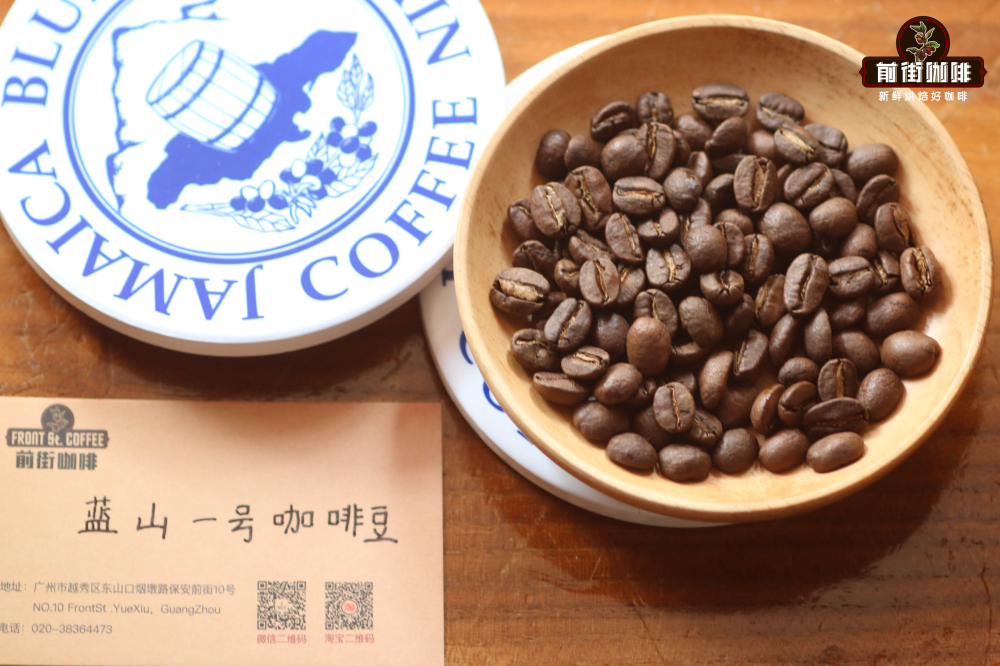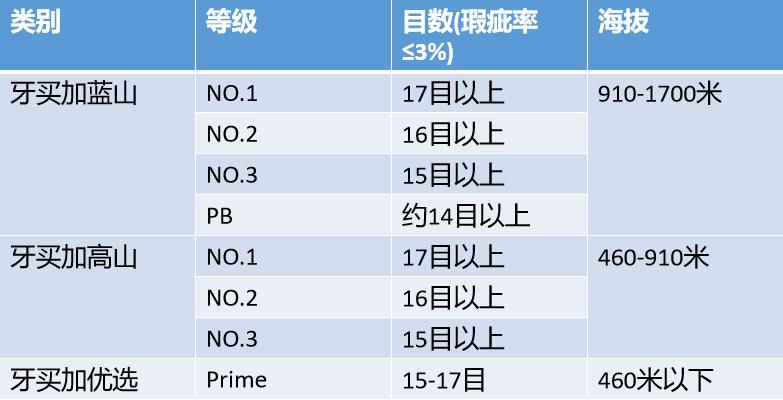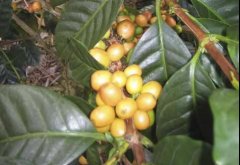On the classification standard of Jamaican boutique Blue Mountain Coffee how many kinds of Blue Mountain Coffee are there
Qianjie believes that everyone is no stranger to Blue Mountain Coffee. There is no doubt that Blue Mountain Coffee Bean is one of the world-famous and expensive coffee beans, which makes people want to see the flavor of Blue Mountain Coffee very much.
In fact, Blue Mountain Coffee is only a category of Jamaican coffee, and what we often call Blue Mountain Coffee actually refers to Blue Mountain No. 1 coffee beans.

Coffee production in Jamaica is centrally managed by the Jamaica Industry Council (CIB), which is divided into three levels according to the altitude at which coffee is grown. The grade of Jamaican Blue Mountain coffee needs to meet the requirement of growing higher than 1000 meters above sea level; the grade of Jamaican mountain coffee needs to be planted between 500m and 1000 meters above sea level; coffee beans of the preferred coffee grade in Jamaica are generally planted below 500m above sea level.
Among them, Jamaica Blue Mountain Coffee is divided into four grades: No. 1, No. 2, No. 3, and round beans. That is to say, Jamaica Blue Mountain one coffee beans are of the highest grade among Jamaican coffee beans. The particle size of Jamaica Blue Mountain one coffee raw beans is 17x18 mesh, and the proportion of defective beans is less than 2%. As a result, the real Jamaican Blue Mountain No. 1 coffee bean production is scarce and the price is on the high side.

Tooth sales plus the law stipulates that only coffee beans from the Blue Mountain area can be called Blue Mountain Coffee.
The high-grade Blue Mountain Coffee is divided into three grades: No. 1 (more than 17cm 18 mesh), No. 2 (16 mesh) and No. 3 (15 mesh), and 17 mesh is equivalent to the size of 17cm 64 inches.
They all taste the same (they all have to be confirmed by dental sales plus government-approved full-time personnel cup test), but they are of different sizes.
These three grades of raw beans must be packed in wooden barrels before they can be exported abroad, which are divided into three specifications: 70 kg / 1 barrel, 30 kg / 1 barrel and 15 kg / 1 barrel.
The name of the farm, the initials of the importer, the batch number of each shipment and the name of the port of arrival will be printed on the barrel.
For example, the Japanese company ATAKA Trading Co., Ltd. has the acronym ATC on the blue mountain coffee bucket.
On the other hand, the blue mountain coffee bucket entered by the Shangshima Coffee Company of Japan has the abbreviation "UCC" in the logo.
So when you see the Blue Mountain coffee bucket, you can know that the coffee comes from the farm where the teeth sell the Blue Mountains.
Who is its importer and what port does it go to?
At the same time, the dental exporter will also provide the importer with a certificate of origin in the color of Lu.
This certificate of origin recognized by the Canadian government is only issued to importers of whole barrel units (70kg / barrel, 30kg / barrel, 15kg / barrel).
It records the name of the export manor, the name of the importer, the goods, quantity, class number, batch number, port of arrival, etc.
(among the coffee beans produced outside the Blue Mountains, only the alpine coffee beans are packed in wooden barrels.)
Then the damaged beans, beans of different sizes, which are not good-looking on the surface but not bad in taste.
The government of Canada stipulates that these raw beans can only be exported abroad in sacks.
And worse than that are the coffee that has a defective taste.
The government of Canada has strict regulations that this kind of coffee cannot be exported abroad in the form of raw beans.
Only after the teeth are sold and baked locally and must be strongly baked can they be exported abroad.
Because only strong baking can cover up or eliminate the defective taste.
And the advantages of Lan Shan Coffee can only be shown perfectly when it is lightly roasted.
So if you buy strong roasted small packages of blue mountain coffee sold from teeth and imported directly from domestic stores
That's the lowest grade of Blue Mountain coffee, but at least it's true Blue Mountain Coffee.
Important Notice :
前街咖啡 FrontStreet Coffee has moved to new addredd:
FrontStreet Coffee Address: 315,Donghua East Road,GuangZhou
Tel:020 38364473
- Prev

Boutique coffee bean coffee variety Pacamara
Pacamara coffee is a hybrid of Pacas Pacas (a sudden variant of the bourbon species) and giant bean Maragogype (a sudden variant of the Tibica species found in Brazil) found in El Salvador in the 1950s. The coffee tree is very tall, the branch spacing of the trunk is wider than that of Pacas Pacas, and the edge of dark green leaves is wavy. It is suitable for cultivation at the elevation of 900m to 1500m.
- Next

Boutique coffee beans Brazil Santos
Brazil is located in South America, about 15 degrees south latitude. Brazilian coffee culture began in 1727 and sprang up in the north of Brazil when a Mr. Francesco de MeloPalheta smuggled coffee seeds from France to Brazil. At that time, this was strongly opposed by the French who monopolize the coffee business today. Those seeds are the ancestors of more than 300 million Brazilian coffee trees today. In the early morning
Related
- Beginners will see the "Coffee pull flower" guide!
- What is the difference between ice blog purified milk and ordinary milk coffee?
- Why is the Philippines the largest producer of crops in Liberia?
- For coffee extraction, should the fine powder be retained?
- How does extracted espresso fill pressed powder? How much strength does it take to press the powder?
- How to make jasmine cold extract coffee? Is the jasmine + latte good?
- Will this little toy really make the coffee taste better? How does Lily Drip affect coffee extraction?
- Will the action of slapping the filter cup also affect coffee extraction?
- What's the difference between powder-to-water ratio and powder-to-liquid ratio?
- What is the Ethiopian local species? What does it have to do with Heirloom native species?

